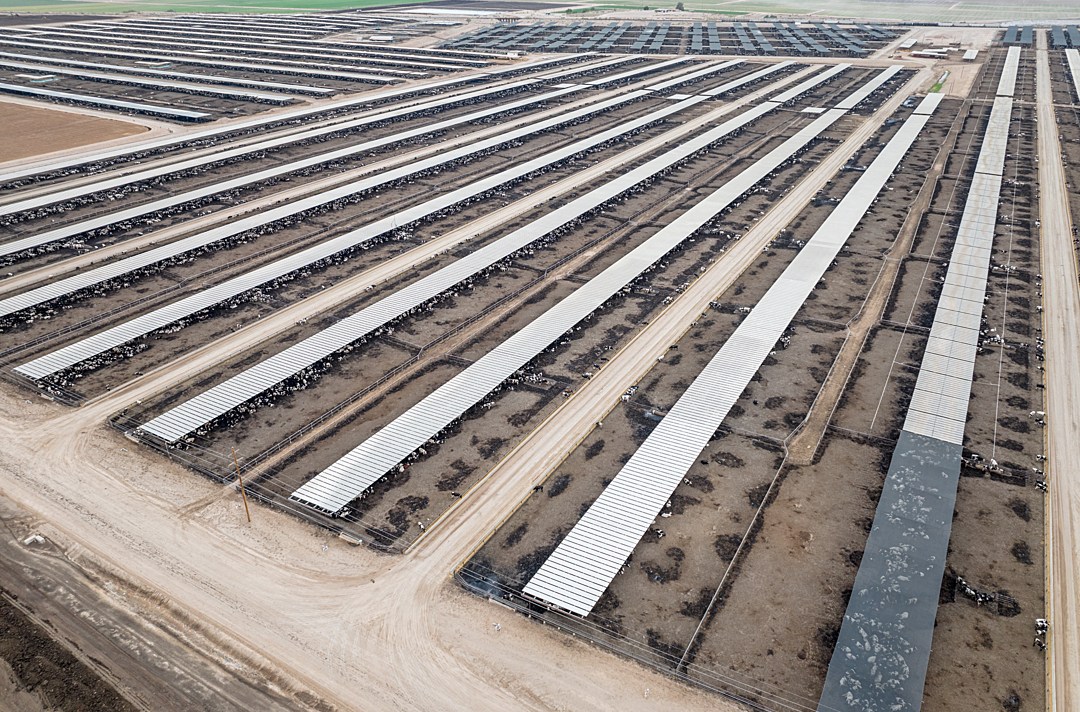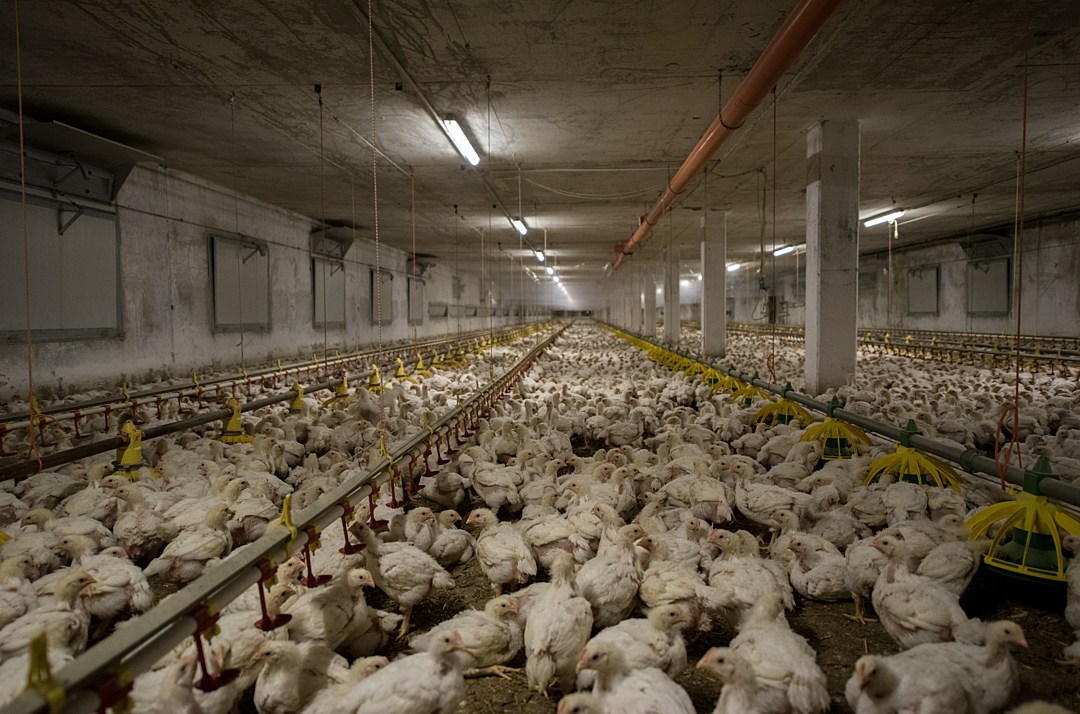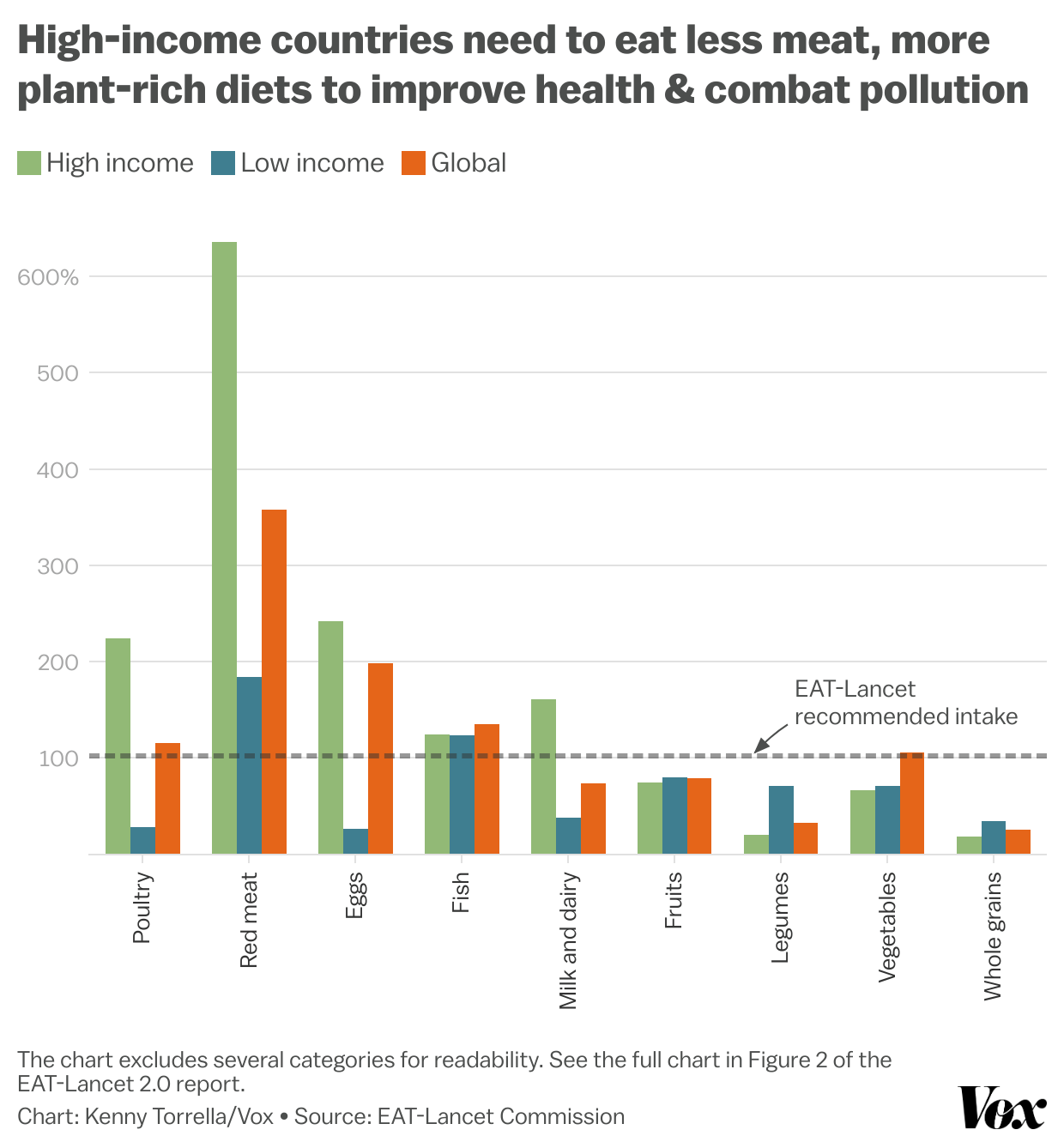The rich must eat less meat
Here’s a sobering fact: Even if the entire world transitions away from fossil fuels, the way we farm and eat will cause global temperatures to rise 1.5 degrees Celsius above preindustrial levels — the critical threshold set in the Paris Climate Agreement. The further we go above that limit, the more intense the effects of climate change will get. The good news is that we know the most effective way to avert catastrophe: People in wealthier countries have to eat more plant-based foods and less red meat, poultry, and dairy. Such a shift in diets — combined with reducing global food waste and improving agricultural productivity — could cut annual climate-warming emissions from food systems by more than half. That’s one of the main findings from a new report by the EAT-Lancet Commission, a prestigious research body composed of dozens of experts in nutrition, climate, economics, agriculture, and other fields. The report lays out how agriculture has played a major role in breaking several “planetary boundaries”; there’s greenhouse gas emissions — of which food and farming account for 30 percent — but also deforestation and air and water pollution. The new report builds on the commission’s first report, published in 2019 — an enormous undertaking that examined how to meet the nutritional needs of a growing global population while staying within planetary boundaries. It was highly influential and widely cited in both policy and academic literature, but it was also ruthlessly attacked in an intensive smear campaign by meat industry-aligned groups, academics, and influencers — a form of “mis- and disinformation and denialism on climate science,” Johan Rockström, a co-author of the report, said in a recent press conference. Our food’s massive environmental footprint stems from several sources: land-clearing to graze cattle and grow crops (much of them grown to feed farmed animals); the trillions of pounds of manure those farmed animals release; cattle’s methane-rich burps; food waste; fertilizer production and pollution; and fossil fuels used to power farms and supply chains. But this destruction is disproportionately committed to supply rich countries’ meat- and dairy-heavy diets, representing a kind of global dietary inequality. “The diets of the richest 30% of the global population contribute to more than 70% of the environmental pressures from food systems,” the new report reads. To set humanity on a healthier, more sustainable path, the commission recommends what they call the Planetary Health Diet, which consists of more whole grains, fruits, vegetables, legumes, and nuts than what most people in high- and upper-middle-income countries consume, along with less meat, dairy, and sugar. But in poor regions, like Sub-Saharan Africa and South Asia, the commission recommends an increase in most animal products, as well as a greater variety of plant-based foods. If globally adopted, this plant-rich diet would prevent up to 15 million premature deaths each year. (The commission notes that the diet is a starting point and should be adjusted to accommodate individual needs and preferences, local diets, food availability, and other factors.) It would also reshape the global food industry, resulting in billions of fewer land animals raised for meat each year and a significant increase in legume, nut, fish, and whole grain production (while many regions currently eat more fish per capita than the report recommends, total global fish production would increase over time under the report’s parameters to meet demand from growing populations). Rather than expecting billions of people to actively change how they eat, the commission recommends a number of policies, including reforming school meals, federal dietary guidelines, and farming subsidies; restricting marketing of unhealthy foods; and stronger environmental regulations for farms. If EAT-Lancet’s main recommendations were to be implemented, shifting to plant-rich diets would account for three-quarters of the major reduction in agricultural emissions. Other recommendations, like improving crop and livestock productivity and reducing food waste, are important, but their impact would be much smaller than diet change, contributing a quarter of expected agricultural emissions reductions. The report is thorough and nuanced, but its conclusions aren’t exactly novel; for the past two decades, scientists have published a trove of studies on the environmental impact of agriculture and have landed on the same takeaways — especially that rich countries must shift their diets to be more plant-based. But that message has, with few exceptions, failed to incite action by governments and food companies, or even the environmental movement itself. That failure can be explained, in part, by the meat industry’s aggressive, denialist response to the scientific consensus on meat, pollution, and climate change. The meat industry’s anti-science crusade, briefly explained In the 2010s, it seemed possible that the US and other wealthy countries might adopt more plant-based diets: Some researchers and journalists predicted that better plant-based meat products, from companies like Beyond Meat and Impossible Foods, could disrupt the conventional meat industry; governments in several countries recommended more plant-based diets; and campaigns like Meatless Monday and Veganuary had gained momentum. This story was first featured in the Processing Meat newsletter Sign up here for Future Perfect’s biweekly newsletter from Marina Bolotnikova and Kenny Torrella, exploring how the meat and dairy industries shape our health, politics, culture, environment, and more. Have questions or comments on this newsletter? Email us at futureperfect@vox.com! These trends posed an existential threat to the livestock sector, and it was in this environment that the first EAT-Lancet report was published. It made international headlines, but the backlash was swift: The meat industry coordinated an intense and successful online backlash operation. Shortly after, the World Health Organization pulled its support for an EAT-Lancet report launch event. One report author said she was “overwhelmed” with “really nasty” comments, and another said he faced career repercussions. In the years that followed, the industry ramped up its efforts to steer policy and narratives in its favor and out of line with scientific consensus: From 2020 to 2023, European meat companies and industry groups successfully weakened EU climate policy. The number of delegates representing the meat industry at the UN’s annual climate change conference tripled from 2022 to 2023. A 2023 United Nations report on reducing climate emissions in the food system omitted meat reduction as an approach, which some environmental scientists found “bewildering” (this could be due to intense meat industry pressure imposed on UN officials). The industry spent a great deal of money attacking plant-based meat companies, downplaying meat’s environmental impact, cozying up to environmental nonprofits, and spreading the narrative that voluntary, incremental tweaks to animal farming methods are sufficient — not regulations and diet shifts. Now, as global ambitions to reduce meat consumption and livestock production have shriveled in the face of intense pressure from industry, the new EAT-Lancet report feels more important, and also more vulnerable, than ever. But I worry most of the climate movement is only too eager to go along with the industry’s preferred approaches and narratives because many environmental advocates, like virtually everyone else across society, don’t want to accept that meat reduction in richer countries is non-negotiable. That much was evident when I attended last month’s Climate Week NYC, the world’s second-largest climate change gathering. The meat conversation missing from Climate Week The annual event brings together some 100,000 attendees for more than 1,000 events across the city. This year, only five events centered on plant-based food as a solution to climate change. In other words, what environmental scientists consider to be the most effective solution to addressing around 16 percent of greenhouse gas emissions received around 0.5 percent of the week’s programming. At the same time, the meat and dairy sectors managed to establish a large presence at Climate Week’s food and agriculture programs. The Protein Pact, a coalition of meat and dairy companies and trade groups, sponsored a panel put on by the climate events company Nest Climate Campus, which listed one of Protein Pact’s representatives — who spoke on its main stage — as a “climate action expert.” The Protein Pact is also a leading sponsor of Regen House, an agriculture events company that hosted several days of Climate Week programming. Meanwhile, the Meat Institute — the founder of the Protein Pact — sponsored events put on by Food Tank, a nonprofit think tank. It would be one thing if the Protein Pact were open to compromise on environmental regulation and spoke more honestly about their industries’ climate impact. But many of its members lobby against environmental action and downplay the industry’s environmental footprint. Some even participated in the campaign against EAT-Lancet’s first report. Given this track record, it’s hard to see the industry’s presence at Climate Week as anything but a reputation laundering effort. The Meat Institute, Food Tank, Nest Climate Campus, and Regen House didn’t respond to requests for comment. This dynamic — in which meat industry narratives are welcomed and legitimized in much of the environmental movement — has contributed to public ignorance of the industry’s pollution and its underreporting in the news media. According to a new, exclusive analysis from the environmental nonprofit Madre Brava, only 0.4 percent of climate coverage in US, UK, and European English-language news outlets mention meat and livestock. Madre Brava also polled US and Great Britain residents and found they underestimated animal agriculture’s environmental impact. Finding hope in Climate Week’s Food Day A lot of climate news coverage — including this story — is depressing and fatalistic, so I’ll try to end on a hopeful note. I felt a bit of this strange emotion at Food Day, a Climate Week event organized by Tilt Collective, a philanthropic climate foundation advocating for plant-rich diets. I’ve attended a lot of conferences on shifting humanity toward more plant-based diets, and I usually end up seeing a lot of the same people. That wasn’t the case at Food Day. There were a lot of unrecognizable faces — people from climate foundations, environmental nonprofits, government agencies, and universities — all eager to take on this big, challenging, fascinating problem, however intimidating it may be. The following day, I attended a climate journalism event hosted by Sentient, a nonprofit news outlet that covers meat and the environment. Similarly, the room was packed with journalists and communications professionals, most of whom don’t cover these issues but were there to learn about them. These events — and the few others that centered on plant-based foods — were overshadowed by the meat industry’s Climate Week presence. But the events did suggest that there’s growing acceptance that we must change the way we eat, and that time is running out to do something about it. That’s not enough, but it’s better than nothing. Given the state of our politics and environmental policy, that’s maybe the best one can hope for.
Here’s a sobering fact: Even if the entire world transitions away from fossil fuels, the way we farm and eat will cause global temperatures to rise 1.5 degrees Celsius above preindustrial levels — the critical threshold set in the Paris Climate Agreement. The further we go above that limit, the more intense the effects of […]

Here’s a sobering fact: Even if the entire world transitions away from fossil fuels, the way we farm and eat will cause global temperatures to rise 1.5 degrees Celsius above preindustrial levels — the critical threshold set in the Paris Climate Agreement. The further we go above that limit, the more intense the effects of climate change will get.
The good news is that we know the most effective way to avert catastrophe: People in wealthier countries have to eat more plant-based foods and less red meat, poultry, and dairy.
Such a shift in diets — combined with reducing global food waste and improving agricultural productivity — could cut annual climate-warming emissions from food systems by more than half. That’s one of the main findings from a new report by the EAT-Lancet Commission, a prestigious research body composed of dozens of experts in nutrition, climate, economics, agriculture, and other fields.
The report lays out how agriculture has played a major role in breaking several “planetary boundaries”; there’s greenhouse gas emissions — of which food and farming account for 30 percent — but also deforestation and air and water pollution.
The new report builds on the commission’s first report, published in 2019 — an enormous undertaking that examined how to meet the nutritional needs of a growing global population while staying within planetary boundaries. It was highly influential and widely cited in both policy and academic literature, but it was also ruthlessly attacked in an intensive smear campaign by meat industry-aligned groups, academics, and influencers — a form of “mis- and disinformation and denialism on climate science,” Johan Rockström, a co-author of the report, said in a recent press conference.
Our food’s massive environmental footprint stems from several sources: land-clearing to graze cattle and grow crops (much of them grown to feed farmed animals); the trillions of pounds of manure those farmed animals release; cattle’s methane-rich burps; food waste; fertilizer production and pollution; and fossil fuels used to power farms and supply chains.


But this destruction is disproportionately committed to supply rich countries’ meat- and dairy-heavy diets, representing a kind of global dietary inequality.
“The diets of the richest 30% of the global population contribute to more than 70% of the environmental pressures from food systems,” the new report reads.
To set humanity on a healthier, more sustainable path, the commission recommends what they call the Planetary Health Diet, which consists of more whole grains, fruits, vegetables, legumes, and nuts than what most people in high- and upper-middle-income countries consume, along with less meat, dairy, and sugar. But in poor regions, like Sub-Saharan Africa and South Asia, the commission recommends an increase in most animal products, as well as a greater variety of plant-based foods.
If globally adopted, this plant-rich diet would prevent up to 15 million premature deaths each year. (The commission notes that the diet is a starting point and should be adjusted to accommodate individual needs and preferences, local diets, food availability, and other factors.)

It would also reshape the global food industry, resulting in billions of fewer land animals raised for meat each year and a significant increase in legume, nut, fish, and whole grain production (while many regions currently eat more fish per capita than the report recommends, total global fish production would increase over time under the report’s parameters to meet demand from growing populations).
Rather than expecting billions of people to actively change how they eat, the commission recommends a number of policies, including reforming school meals, federal dietary guidelines, and farming subsidies; restricting marketing of unhealthy foods; and stronger environmental regulations for farms.
If EAT-Lancet’s main recommendations were to be implemented, shifting to plant-rich diets would account for three-quarters of the major reduction in agricultural emissions. Other recommendations, like improving crop and livestock productivity and reducing food waste, are important, but their impact would be much smaller than diet change, contributing a quarter of expected agricultural emissions reductions.
The report is thorough and nuanced, but its conclusions aren’t exactly novel; for the past two decades, scientists have published a trove of studies on the environmental impact of agriculture and have landed on the same takeaways — especially that rich countries must shift their diets to be more plant-based. But that message has, with few exceptions, failed to incite action by governments and food companies, or even the environmental movement itself.
That failure can be explained, in part, by the meat industry’s aggressive, denialist response to the scientific consensus on meat, pollution, and climate change.
The meat industry’s anti-science crusade, briefly explained
In the 2010s, it seemed possible that the US and other wealthy countries might adopt more plant-based diets: Some researchers and journalists predicted that better plant-based meat products, from companies like Beyond Meat and Impossible Foods, could disrupt the conventional meat industry; governments in several countries recommended more plant-based diets; and campaigns like Meatless Monday and Veganuary had gained momentum.
This story was first featured in the Processing Meat newsletter
Sign up here for Future Perfect’s biweekly newsletter from Marina Bolotnikova and Kenny Torrella, exploring how the meat and dairy industries shape our health, politics, culture, environment, and more.
Have questions or comments on this newsletter? Email us at futureperfect@vox.com!
These trends posed an existential threat to the livestock sector, and it was in this environment that the first EAT-Lancet report was published. It made international headlines, but the backlash was swift: The meat industry coordinated an intense and successful online backlash operation. Shortly after, the World Health Organization pulled its support for an EAT-Lancet report launch event. One report author said she was “overwhelmed” with “really nasty” comments, and another said he faced career repercussions.
In the years that followed, the industry ramped up its efforts to steer policy and narratives in its favor and out of line with scientific consensus:
- From 2020 to 2023, European meat companies and industry groups successfully weakened EU climate policy.
- The number of delegates representing the meat industry at the UN’s annual climate change conference tripled from 2022 to 2023.
- A 2023 United Nations report on reducing climate emissions in the food system omitted meat reduction as an approach, which some environmental scientists found “bewildering” (this could be due to intense meat industry pressure imposed on UN officials).
- The industry spent a great deal of money attacking plant-based meat companies, downplaying meat’s environmental impact, cozying up to environmental nonprofits, and spreading the narrative that voluntary, incremental tweaks to animal farming methods are sufficient — not regulations and diet shifts.
Now, as global ambitions to reduce meat consumption and livestock production have shriveled in the face of intense pressure from industry, the new EAT-Lancet report feels more important, and also more vulnerable, than ever.
But I worry most of the climate movement is only too eager to go along with the industry’s preferred approaches and narratives because many environmental advocates, like virtually everyone else across society, don’t want to accept that meat reduction in richer countries is non-negotiable. That much was evident when I attended last month’s Climate Week NYC, the world’s second-largest climate change gathering.
The meat conversation missing from Climate Week
The annual event brings together some 100,000 attendees for more than 1,000 events across the city. This year, only five events centered on plant-based food as a solution to climate change. In other words, what environmental scientists consider to be the most effective solution to addressing around 16 percent of greenhouse gas emissions received around 0.5 percent of the week’s programming.
At the same time, the meat and dairy sectors managed to establish a large presence at Climate Week’s food and agriculture programs.
The Protein Pact, a coalition of meat and dairy companies and trade groups, sponsored a panel put on by the climate events company Nest Climate Campus, which listed one of Protein Pact’s representatives — who spoke on its main stage — as a “climate action expert.” The Protein Pact is also a leading sponsor of Regen House, an agriculture events company that hosted several days of Climate Week programming. Meanwhile, the Meat Institute — the founder of the Protein Pact — sponsored events put on by Food Tank, a nonprofit think tank.
It would be one thing if the Protein Pact were open to compromise on environmental regulation and spoke more honestly about their industries’ climate impact. But many of its members lobby against environmental action and downplay the industry’s environmental footprint. Some even participated in the campaign against EAT-Lancet’s first report.
Given this track record, it’s hard to see the industry’s presence at Climate Week as anything but a reputation laundering effort.
The Meat Institute, Food Tank, Nest Climate Campus, and Regen House didn’t respond to requests for comment.
This dynamic — in which meat industry narratives are welcomed and legitimized in much of the environmental movement — has contributed to public ignorance of the industry’s pollution and its underreporting in the news media.
According to a new, exclusive analysis from the environmental nonprofit Madre Brava, only 0.4 percent of climate coverage in US, UK, and European English-language news outlets mention meat and livestock. Madre Brava also polled US and Great Britain residents and found they underestimated animal agriculture’s environmental impact.
Finding hope in Climate Week’s Food Day
A lot of climate news coverage — including this story — is depressing and fatalistic, so I’ll try to end on a hopeful note. I felt a bit of this strange emotion at Food Day, a Climate Week event organized by Tilt Collective, a philanthropic climate foundation advocating for plant-rich diets.

I’ve attended a lot of conferences on shifting humanity toward more plant-based diets, and I usually end up seeing a lot of the same people. That wasn’t the case at Food Day. There were a lot of unrecognizable faces — people from climate foundations, environmental nonprofits, government agencies, and universities — all eager to take on this big, challenging, fascinating problem, however intimidating it may be.
The following day, I attended a climate journalism event hosted by Sentient, a nonprofit news outlet that covers meat and the environment. Similarly, the room was packed with journalists and communications professionals, most of whom don’t cover these issues but were there to learn about them.
These events — and the few others that centered on plant-based foods — were overshadowed by the meat industry’s Climate Week presence. But the events did suggest that there’s growing acceptance that we must change the way we eat, and that time is running out to do something about it. That’s not enough, but it’s better than nothing. Given the state of our politics and environmental policy, that’s maybe the best one can hope for.

